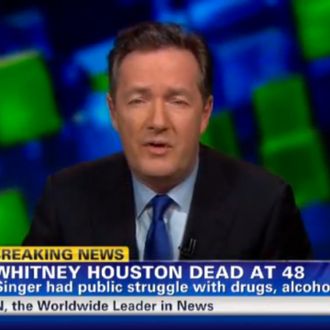
The 24-hour-news networks have always treated the tragic, sudden death of a wildly famous celebrity like they do a bomb threat or other fresh crime. They sweep any other news off of their desks in order to unrelentingly focus on the barest information, constantly running the small amount of news footage they have (usually of police tape at the scene and police or medics milling about), vamp with cautious speculation (along with constant warnings against the dangers of speculation), and have experts weigh in on a situation that they know nothing specifically about. (In a bomb threat, it’s a security expert. In a celebrity death, it’s Dr. Drew.) The main difference is that with a celebrity death, the news producers can augment coverage with old red-carpet footage and clips of old performances — be they musical or acting — to underline just what we’ve lost and the highs from which this dead star plummeted.
Ten years ago, this predictable game plan was irritating, yes, yet somewhat reassuring: It created the illusion of a virtual community. The networks acted as mood rings that absorbed and intensified whatever the public was feeling about the late celebrity. People instinctively turned to them not just to supplement rumor with sparse facts, but to be reassured that they weren’t alone, that there were more people out there who cared. Even if the blather was melodramatic, stunned fans were feeling melodramatic and the unending parade of photos and video made for a reassuring collage of grief. But now, as people head to Twitter and Facebook to publicly profess their misery and post the relics they’ve dug out of YouTube, the news networks’ last shred of incidental usefulness in these types of stories has been rendered moot.
Though the initial news of Whitney Houston’s death was broken by the Associated Press, Twitter and Facebook took it from there. Feeds were clogged with people throwing up howls of sadness, then moving on to wildly creating video jukeboxes of favorite performances, as if tearing out pages of old scrapbooks and tossing everything out on the floor to wallow in while mumbling Oh, God, remember this? And this! And I played this over and over in high school! These were the basic backstory, personal testimonials, and unedited bursts of raw emotion that we used to get from TV news, plus links to old news stories, reviews, photographs, and video clips that illuminated the late celebrity’s life and work. Is it more edifying to hear anchors or Simon Cowell or Jermaine Jackson (both of whom were interviewed on CNN Saturday) talk about Houston mere hours after her death, or to spend the first evening after the news broke obsessively sharing your memories and grief with fellow mourning acquaintances, linking to well-done obits and critical exegeses? Surely it was the latter.
Throughout Saturday night, Fox News Channel’s anchors and correspondents wept crocodile tears over Houston, as they always do when legendary African-American entertainers die, because it gives them a chance to pretend that they aren’t spending the rest of their days scaring their overwhelmingly old, white audience with threats that the United States is being overrun by vengeful socialist brown people with gold teeth who listen to horrible boom-boom music and want you to press 2 for English. MSNBC stumbled around as usual while CNN puffed itself up as if it were offering definitive coverage while airing boilerplate factoids and letting its guests and some of its contributors say useless and often dopey things. They kept this up because they believe it is their mission and ability to bring you context and reporting that a Twitter feed can not. And so Reverend Al Sharpton, a friend of Houston’s family for, he said, twenty years, explained to CNN that, “She brought music to a whole other level, and then she transitioned into acting. She was one of the most beautiful women you would see. She was one that didn’t need makeup to look beautiful!” This was insight as easily gleaned from a Wikipedia entry.
The anchors often broke to read celebrity-tweeted condolence notes. As recently as ten years ago, a news outlet could seek an official statement from a celebrity who knew or appreciated the deceased, print it in a newspaper or read it aloud on TV, and honestly claim that they’d reported the story, albeit in a low-impact way. Now that Twitter has mostly bypassed the traditional celebrity press release, that’s no longer the case. They are simply and uselessly reading aloud the same quote that most people who care have already been dispatched directly. Any news anchor reading celebrity tweets should wear a sign that reads, “I am useless”: It is like touting the reading of skywriting as a “get.”
TV news seems to be gauging the tone of its response by reading Twitter feeds: They estimate the size of the outpouring of grief, multiply their own response by ten, but divide the sincerity by twenty. What remains is of almost zero value to viewers. At least when they have little to say about a bomb threat but say it over and over again, viewers still remain transfixed because they are waiting for the moment that they will be told they are safe. But when a beloved star dies, there is no safety, only sadness and fascination. And having someone like Piers Morgan elbow his way into the virtual wake is just as inappropriate and useless as him doing so at a real one.





